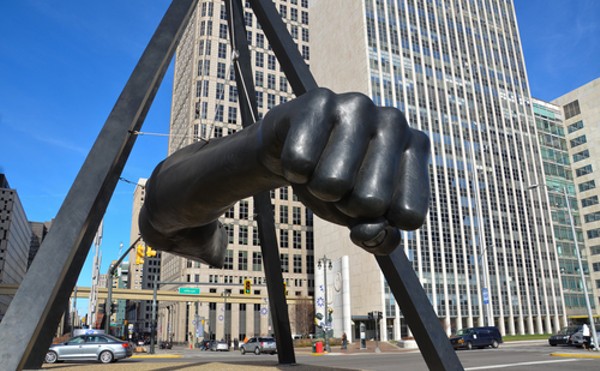There's going to be plenty of hand-wringing Wednesday morning over the utter failure of Proposal 1 at the polls on Tuesday, as well as what Plan B is now in play to Fix The Roads.
For those who didn't vote, the proposed constitutional amendment was a quote-unquote "solution" to fixing Michigan's dilapidated road infrastructure. We'll spare you the nuts and bolts given the special election is now over — but, among other things, it would've increased the sales tax from 6 percent to 7 percent, raising about $1.9 billion-$2 billion to be divvied up thusly: There'd be a fresh pot of $1.2 billion-$1.3 billion appropriated for roads, while the remainder would be split for municipalities, schools, and public transit.
By 9:45 p.m. Tuesday night, early results showed as much as 80 percent of voters had shot down the convoluted, wordy offering.
A sales tax hike is regressive, but the state Legislature aimed to offset the impact to low-income families by restoring the Earned Income Tax Credit from 6 percent to 20 percent of the federal version. The EITC was eliminated in 2011 and, if Proposal 1 passed, would've aided 800,000 families by giving them a small net tax break ranging from — depending on who you ask — an estimated $24 to $138 annually.
Taking the argument one step further, Prop 1 supporters said, the increase of road funding would help offset the so-called "pothole tax" — the annual repair costs motorists spend on vehicle upkeep. Studies — funded by road builders — suggest this figure is north of $350 per year. In sum, the EITC was one of a number of Easter eggs to get Democrats on board for this legislative Rube Goldberg gizmo the state Legislature had concocted.
The problem? There were plenty of issues with Proposal 1 that went far beyond simply describing it as "not perfect," a common refrain uttered in the millions of dollars of ads spent in recent weeks on the campaign. The fact it was convoluted doesn't begin to scratch the surface.
First, the amount that would've been raised for road repairs would've kept things, at best, sub-par — and no, this has nothing to do with Proposal 1's boost to public transit and school funding (defined, remarkably, by opponents as "special interests").
In March 2014, Rick Olson, a former Republican state representative, released his annual report on the so-called "road crisis" and found the state needs roughly $2.2 billion annually in additional funds to actually improve our road infrastructure.
"The conclusion reached was that if the investments projected by these models are not done, either the deferred costs of maintaining our roads will be much higher OR we choose to accept lower quality roads," wrote Olson in the report, which included analytical work from Gil Chesbro and Jim Ashman of the Michigan Department of Transportation (MDOT).
The report took into consideration updated construction costs and used a model "with a combination of the change in road condition AND with the construction cost numbers updated to reflect current conditions."
Taking Olson at his word, that means Proposal 1 would've netted $1 billion less than what projections show is required for decent roads in Michigan.
(Here's the kicker: Back in 2011, Olson's crew projected the state would need $1.4 billion more annually to maintain the state's roads and bridges — still more than what Proposal 1 would've generated.)
And, late Wednesday, after vote totals started trickling in, the County Road Association of Michigan blasted out a press release with this bleak statement, affirming the aforementioned with a comment from Burt Thompson, president of the association:
“A year ago we pegged the amount of repairs needed at $2.1 billion annually based on previous studies of the issue – and that amount would still require several years of commitment to getting our roads in acceptable condition. A year later, we can safely say the tab for fixing our roads is probably $2.5 billion based on this $3 million-per-day deterioration."
Beyond that, as the nonpartisan Senate Fiscal Agency stressed in its analysis of Proposal 1, "It is important to note that under the reform package, any new revenue in excess of $800 million FY 2015-16 and $400 million in FY 2016-17 would be directed to pay down existing transportation debt."
Translation: The state couldn't have made use of the entire $1.2 billion-$1.3 billion increase until 2017.
That, at first glance, pokes holes in the "pothole tax" argument. Set aside that owning a vehicle fundamentally requires upkeep (e.g., getting an oil change every three months, considered to be the recommended time frame, costs at least $80 annually, depending on what type of oil is used). If you own a car, it will break down. This is fact. Given that Proposal 1 wouldn't have generated what's considered an adequate level needed to actually improve Michigan's roads, the argument that vehicle repair costs would drop is at best, misleading; at worst, irrelevant. And the savings for low-income families of — at best — $138 annually, would immediately appear to be less of a certainty.
(A curious observer might wonder what other solutions exist to eliminate the reliance on vehicles and their expected repairs. Of course, that would require the consideration of providing a substantial influx of funding for comprehensive and efficient public transit in the state, something that can't be muttered around town without being laughed out of the room.)
Another argument proffered by some observers is that our state Legislature is loaded with an additional cast of anti-tax fanatics this cycle — something MT's own Jack Lessenberry has cited as reason for, grudgingly, supporting Proposal 1. By extension, the argument went, if Proposal 1 fails, Republican legislators would've instead taken it as a mandate to slash funding for programs to divert funds for roads.
While there's merit to the point, it negates the fact that — assuming Republicans maintain control of the Legislature and Governor's office in the coming years — whether or not Prop 1 passed, we'd have been unlikely to see another tax hike to fund basic needs on the table until ... who knows, probably the next time our roads fall into complete disarray?
The legislature has already demonstrated its complete lack of desire, and will, to make the decision itself. Proposal 1 would've green-lighted a sales tax increase that, according to Olson's report, wouldn't have increased enough funding for roads; it would've made the mere thought of a tax hike even more reprehensible to legislators.
There's still another side here that hasn't been taken into consideration. Yes, the legislature is full of a fine bunch who forced voters to make the decision here — one that, if addressed by Lansing, would've (in theory) jeopardized plenty of seats in the next election. (The mere thought of that should make any inspirational career politician faint.)
But what's remarkable is this: The legislature evidently feels comfortable to punt to voters when it doesn't have the spine to make a tough decision that could hurt their chances at re-election, and it undermines voter-initiated petitions when it's convenient to their interests. Through a rotating cast, the Republican-led Senate and House have made a point to spike attempts by voters to implement legislative changes on an as-needed basis.
You may recall, back in 2012, a massive petition drive was launched to repeal the beefed-up emergency manager law passed by Snyder. In the general election that year, voters overwhelmingly voted to repeal the law. And then, six weeks later, the legislature passed a virtually identical version that was promptly signed by Snyder. The bill had an appropriation attached to it, rendering it impossible for voters to repeat their act.
There was also last year's insane effort by Republicans and Snyder to ensure the state's controversial wolf hunt was allowed. As we previously reported:
Quite a mess, no?
Way back in December of 2012, the Legislature approved a bill that designated wolves as a species that could be hunted. The state's Natural Resources Commission set a hunt for last fall.
In response, a group immediately responded to the slated hunt and gathered enough signatures to ask voters in the November 2014 election to repeal the law that started the entire process, PA 520.
But, the Republican-led Legislature wasn't having any of that — so they passed a second bill, which allowed the Natural Resources Commission to designate wolves as a game species unilaterally, without legislative approval. Therefore, the first ballot referendum approved for the November 2014 ballot is nullified.
Then, last year, former Senate Majority Leader Randy Richardville (R-Monroe) waged an effort to prevent any effort at the ballot to see Michigan's minimum wage increased to $10.10-per-hour. The proposed ballot initiative would've accomplished the feat by amending Michigan's 50-year-old minimum wage law.
Richardville wanted nothing to do with it. He swiftly torpedoed the effort by proposing a bill that would repeal the state's former minimum wage law, thereby blocking the $10.10-per-hour ballot proposal from having any impact. Now, the end result was Republicans conceded and agreed to a hike that brings the minimum wage to $9.25-per-hour by 2018, and it's unclear if the $10.10 group had enough signatures to land the proposal on the ballot — but the point is, the legislature preemptively made it irrelevant.
Whatever Plan B gets tossed around — and the one crafted by former Republican State House Speaker Jase Bolger passed last December, which estimates say would eventually gut the state School Aid Fund by $800 million annually, should not be taken seriously — it should be something that addresses the need that exists in an equitable fashion. The best way to do it? Here's Lessenberry's analysis from last month:
The gas tax would probably have been the best way to do this. It provides some rough justice; those who drive the most pay the most; those who don't drive would pay nothing.
Gasoline prices fluctuate so wildly now that people would barely notice an extra dime per gallon, say. Especially now that gas is cheaper than it has been in many years.
That's a thought, one pushed by Richardville before he left office. Given that Snyder has called for an extra $1 billion and more for roads since 2012, however, it's evident some other type of action will be needed if voters are serious about necessitating some change, rather than continue along with a crew that's comfortable with the status quo — and, perhaps, that could begin at the next election when seats in the legislature are up for grabs.






